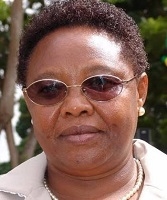
Mary Michael NAGU
YEAR OF MATRICULATION: 1973
EDUCATION:
Mary Nagu, née Michael, was one of the most illustrious female students at the University of Dar es Salaam in the 1970s, and, certainly, one of the exemplary women graduates and trusted employees of corporate institutions and government departments of the years of economic experimentation and debates of the 1970s-90s.
Like the majority of university-going students of the 1970s, she hailed from a rural district, born of rural-peasant parents in the Hanang district of the-then Arusha [now Manyara] region of Tanzania. This was born on 11 May 1952, going to school for primary education at Endasak (19601962), Katesh (1962-1963) and Nangwa (1964-1966). From there, she proceeded?beyond home district confines?to Weruweru girls secondary school in Moshi for the Certificate of Secondary Education Examination subjects (CSEE), popularly termed at that time ‘O-Level’ (1967-1970) and Kilakala girls in Morogoro for the Advanced Certificate in Secondary Education Examination subjects (ACSEE), or ‘A-Level’, from 1971 to 1972. With good principal passes, she was selected for university undergraduate studies at the University of Dar es Salaam within the-then Faculty of Arts and Social Sciences (disaggregated today into two separate colleges of Humanities and Social Sciences). Just as she had been one of the best girls in the CSEE and ACSEE subjects, so also was she to demonstrate the same scholastic aptitude and drive in university education, particularly when one had to combine economics with mathematics and/or statistics. It was such subjects that eased her way into the “industrial economics” specialisation. She became a power to reckon with in the vibrant competition with some of the bright boys in university programmes. She earned her BA in Economics in 1976.
Like other successful graduates of the 1970s, Mary found early employment with a number of public and parastatal institutions, beginning with the National Development Corporation (NDC) as operations officer (1976-1978); then Morogoro Tanneries as a marketing officer (19791980); Morogoro Shoes as planning and marketing officer (1981-1982); then Morogoro Leather Goods for a total of nine years as planning and marketing manager (from 1983-85) and as General Manager (from 1986-1992). For the two years that followed, from 1993 to 1995, Mary Nagu served in the President’s Office as a consultant on the national task of reviewing and restructuring parastatal organisations under a newly legislated Parastatal Sector Reform Commission (PSRC) which was created by the Public Corporations Act of 1992. In the meanwhile, from 1982 to 1984, Mary had combined her public service with pursuit of a master’s degree in economics at the University of Dar es Salaam. Later in 2002, she embarked on a doctoral study programme in economics at Washington International University, in the US, which she completed in 2004.
But Mary Nagu has also played a prominent role in the politics of Tanzania. She first became a Member of Parliament in 1995 under the banner of the ruling party, CCM [Chama cha Mapinduzi] and representing her Hanang constituency, subsequently being appointed a Minister for Community Development, Women Affairs and Children, well until 2000. From 2000, she was Minister of State in the President’s Office responsible for Public Service Management, up to 2005. In 2006, she was appointed Minister of Justice and Constitutional Affairs, serving in that position up to 2007. From 2007, well until 2010, she was Minister of Industries and Trade, continuing as a minister in 2010-2015 in the Prime Minister’s office responsible for Investment and Empowerment. Along these official roles, Dr. Nagu has been one of several senior and highly valued professional leaders serving in one capacity or another on several committees of the ruling party.
As a previous minister for investment and empowerment, and with the backing of a strong intellectual grasp and professional experience in economic affairs, Dr Nagu has participated fully in various economic and investment forums, conferences and consultations related to development at national and international levels. Her participation in the World Economic Forum, for instance, has shed light on various socioeconomic aspects and on options for development paths?all which have stimulated national and international debates at institutions such as the University of Dar es Salaam, Mzumbe University and REPOA [Research on Poverty Alleviation]. Truly, UDSM, her mother-university, feels proud of her.

